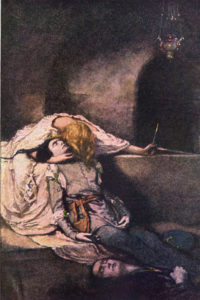While Romeo and Juliet is arguably Shakespeare’s most famous work, casual fans rarely know that few of Shakespeare’s plots were original. The tale of the star-cross’d lovers dates back at least to The Tragical History of Romeus and Juliet, by Arthur Brooke (1562). His, in turn, was based either on an Italian novella by Matteo Bandello, or a via a French translation of that novella (theories vary).

I’m not about to claim that we should teach Brooke to high school students. It’s hard enough to get Romeo and Juliet into their heads. But that doesn’t mean we can’t bring him into the conversation,. I was looking at Brooke’s text tonight to answer a different question, and I found this. I guess it’s his version of what Shakespeare turned into the famous prologue:
Love hath inflaméd twain by sudden sight,
And both do grant the thing that both desire
They wed in shrift by counsel of a friar.
Young Romeus climbs fair Juliet’s bower by night.
Three months he doth enjoy his chief delight.
By Tybalt’s rage provokéd unto ire,
He payeth death to Tybalt for his hire.
A banished man he ‘scapes by secret flight.
New marriage is offered to his wife.
She drinks a drink that seems to reave her breath:
They bury her that sleeping yet hath life.
Her husband hears the tidings of her death.
He drinks his bane. And she with Romeus’ knife,
When she awakes, herself, alas! she slay’th.
That … is a surprisingly good summary of the entire play. Much better than Shakespeare’s version. Let’s look:
- love at first sight
- They get married in secret.
- Romeus visits Juliet’s bedroom at night.
- They get three months of this (which Shakespeare took away!).
- Romeus gets Tybalt angry, ends up killing Tybalt, and is banished for his trouble.
- .They try to get Juliet to marry someone, but she fakes her death instead
- Romeus hears that she’s dead and poisons himself.
- Juliet kills herself with Romeus’ knife.
With a little editing love to modernize the spelling and a couple of glossary notes, you could give this to students as a plot study guide. Other than the three months thing, this is spot-on accurate with how Shakespeare told it, right down to the specific murder weapons.
Students might also be interested to know the “original” ending!
The poem’s ending differs significantly from Shakespeare’s play—in the poem, the nurse is banished and the apothecary hanged for their involvement in the deception, while Friar Lawrence leaves Verona to end his days in a hermitage.
https://en.wikipedia.org/wiki/The_Tragical_History_of_Romeus_and_Juliet
Alas, poor apothecary. He was so worried about doing the wrong thing (“Such mortal drugs I have; but Mantua’s law is death to any he that utters them.”) Shakespeare decides to let him live. Maybe it was to make up for Mercutio?

One other Shakespeare difference: Brooke blamed the tragedy on the lovers and their “Unhonest desires”. I think I mentioned this in the Ice Age when I was last here. 🙂
From Brooke’s preface:
And to this end, good Reader, is this tragical matter written, to describe unto
thee a couple of unfortunate lovers, thralling themselves to unhonest desire ; neglecting the authority and advice of parents and friends ; conferring their principal counsels with drunken gossips and superstitious friars (the naturally
fit instruments of unchastity) ; attempting all adventures of
peril for th’ attaining of their wished lust ; using auricular
confession, the key of whoredom and treason, for further- ance of their purpose ; abusing the honourable name of lawful marriage to cloak the shame of stolen contracts; finally by all means of unhonest life hasting to most unhappy death.’
He’s quite the hell fire preacher in the rest of his intro.
They were married, after all, even in his version.
I guess, like all vociferous moralizers, he was titillated by such outrageous ‘sinning’. LOL
WHOA WHOA WHOA and WHOA. Where have you been? Welcome back! Have you been reading this whole time?
Hey Duane,
Someone commented on a post I made 10 years ago on your r/shakespeare thread so I decided to come here afterwards. I’ve sort of been out of it all since covid and just got back (dragged back, really) into performing this past January. May have some directing jobs coming up in a while as a result of sticking my head out of the sand. Figured I’d better sharpen up my critical/analytical pencil a little:) I have checked in here on and off, but never posted.
I hope all is well with you and yours. I’ll be around.
Best, JM
Well, nice to have you back. Blogging’s not what it used to be, the comment section’s a real ghost town. Everybody gets all their updates via their social media channel of choice. I gotta get a post up about the John/Joan Catholic letter discovery, that should generate at least a few thoughts from people.
Thanks a lot.
Sad that the exchanges aren’t what they used to be. Read through some old stuff here and at r/shakespeare. We got a lot of good info out there once upon a time.
It’s still important that we actually TALK to one another about this stuff. Your TL;DR post reminded me all too well of that. Any of the old crowd show up at all? Ever hear from catkins (aka Carl)? I’ll try to be more present.
Cheers.
I’m friends with catkins over on FB but I don’t see him much here anymore. Same with David Blixt, who remains a big part of the Michigan Shakespeare Festival even after becoming a successful novelist. Bardfilm, aka kj, I speak with daily and can still be seen in the comments pretty regularly.